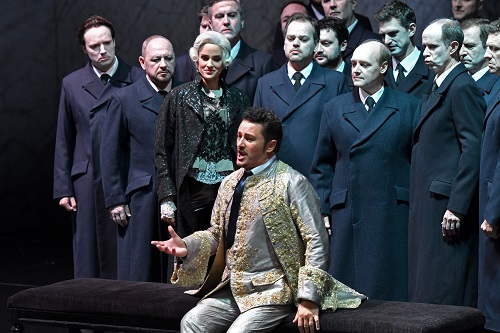 Spain Verdi, Un ballo in maschera: Liceu Orchestra and Chorus / Renato Palumbo (conductor), Gran Teatre del Liceu, Barcelona, 23 & 24.10.2017. (JMI)
Spain Verdi, Un ballo in maschera: Liceu Orchestra and Chorus / Renato Palumbo (conductor), Gran Teatre del Liceu, Barcelona, 23 & 24.10.2017. (JMI)

Casts:
Riccardo – Piotr Beczala/Fabio Sartori
Amelia – Keri Alkema/Maria José Siri
Renato – Carlos Álvarez/Giovanni Meoni
Ulrica – Dolora Zajick/Patricia Bardon
Oscar – Katerina Tretyakova
Sam – Roman Ialcic
Tom – Antonio Di Matteo
Silvano – Damián del Castillo
Judge – Joan Prados/José Luis Casanova
Amelia’s Servant – Emili Rosés/Josep Lluís Moreno
Production: Toulouse Capitole in co-production with Nürnberg Staatstheater
Director – Vincent Boussard
Sets – Vincent Lemaire
Costumes – Christian Lacroix
Lighting – Guido Levi
It has been 17 years since Un ballo in maschera was last performed at the Liceu. Many will remember the national scandal at the time, caused by the excesses of Calixto Bieito’s production. The current Liceu staging opened the season in Toulouse three years ago. I attended that performance, and my opinion hasn’t changed. I do wonder what the Liceu has seen in the production that caused them to offer it: review.
The musical direction was entrusted to Renato Palumbo. Recently, I’ve been disappointed in his conducting, but here it was stronger, more intense and dramatic, and with appropriate tempos. He drew a good performance from the orchestra, which confirms their continuing improvement. The chorus was also correct, but their lack of movement on stage was often inconvenient.
Two casts had been programmed, but there were a number of cancellations. The most notable of these came from Russian baritone Dmitri Hvorostovsky, and one hopes this magnificent baritone will soon recover. To that one must add the cancellation of the young and promising soprano Ekaterina Metlova as Amelia. And on it goes. Marco Caria was not feeling well and was replaced by Carlos Álvarez – a change that received a huge ovation when announced from stage. Elena Sancho Pereg dropped out of the first cast and was replaced by Katerina Tretyakova.
In the first cast, the role of Riccardo was sung by Piotr Beczala, who possesses one of the most elegant and beautiful voices today. He was excellent throughout the opera, especially in the Act II duet with Amelia and in his scene that precedes the masked ball, where he was particularly outstanding.
In the second cast, tenor Fabio Sartori sang the part. His voice is attractive and nicely suited to the character, but he lacked expressiveness, which made his singing rather monotonous.
Keri Alkema, who replaced Ekaterina Metlova as Amelia, also interpreted this character in the Toulouse premiere of the production. Until recently, she had focused on the mezzo soprano repertoire, but she has now moved to soprano roles. Her voice is ample and attractive although somewhat impersonal. The best part of her performance was the aria ‘Morrò, ma prima in grazia’, but her ‘Ecco l`orrido campo’ was less compelling. In the second cast, Amelia was performed by Maria José Siri, who fell a little short in vocal terms.
Carlos Álvarez had sung the part of Renato in the first two performances of this Barcelona cycle, and it was a luxury to get him to substitute at the last minute. He is one of the best Verdi baritones today, if not the finest. He shone in the character, although he did not seem to be in his best vocal shape. It was still a treat to have him. Giovanni Meoni was a satisfactory Renato.
Dolora Zajick was Ulrica, and while her voice is not the most suitable for the character, she was better than her colleague in the second cast. Her voice, still powerful though not comparable to that of some ten years ago, shines at the top but falls short in the lower range. Patricia Bardon was unconvincing as Ulrica, tight at the top and weak at the bottom.
Soprano Katerina Tretyakova did nicely as Oscar on both nights, but I preferred her as Susanna last summer.
In the secondary characters, Damián del Castillo was a sonorous Silvano. Roman Ialcic and Antonio Di Matteo, playing Sam and Tom respectively, did well.
José M. Irurzun